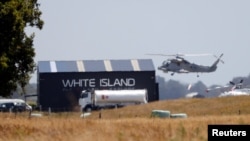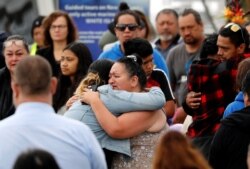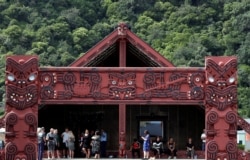A New Zealand military team recovered six bodies Friday from the volcanic island that fatally erupted earlier this week, in a high-risk operation watched by dozens of grieving family members waiting on the mainland.
Military personnel worked as quickly as possible after using helicopters to land on White Island, which experts have said still has a 50-60% chance of another eruption in the coming hours.
Six of the eight bodies on the island were successfully retrieved and taken to a naval patrol vessel for transfer to the mainland for disaster victim identification, New Zealand police said.
Officials in Australia, where the six victims were from, said time limits on the risky operation had prevented the recovery team from locating and removing the other two bodies.
"It has been an incredibly difficult operation but it has been such a priority," New Zealand Prime Minister Jacinda Ardern told Australian Broadcasting Radio Corp on Friday morning. "We just want to bring loved ones home."
The volcano, a popular tourist destination for day-trippers, erupted Monday, spewing ash, steam and gases over the island. Among the 47 people on the island at the time were Australian, U.S., German, Chinese, British and Malaysian tourists.
The official death toll stands at eight as the bodies on the island have been classified as missing until they are formally identified. More than two dozen more people are in hospitals across New Zealand and Australia, most with severe burn injuries.
A blessing was held at sea with the victims' families before the mission was launched. On the shoreline of the town of Whakatane on New Zealand's North Island, which lies some 50 km (30 miles) west of the island, about 100 family and local community members prayed and sang together as they watched helicopters enter and leave the island.
Locals Boz Te Moana, 24, and Michael Mika, 28, came to support families gathered at the marae, a Maori community center.
"Where we come from we don't leave anyone behind, no one gets left behind," Te Moana said of his Maori community. "We all move as one."
'Horrific' injuries
Weather conditions, both at sea and on the island, were favorable for the recovery, police said, but the operation took longer than expected because of the extensive protective equipment the recovery team needed to wear.
Police had been confident of the location of six of the bodies, as they had been viewed from the air, but had cautioned there would be limited opportunity to search for the other two.
"The New Zealand authorities have indicated they will return as soon as it is possible to do so," Australian Foreign Minister Marise Payne told reporters in Sydney.
Payne said the six bodies removed from the island were those of Australian tourists, adding that 11 injured Australians have now been transferred from overloaded burns units in New Zealand, with one more to be repatriated in the "coming days."
Australians made up the majority of the tourists visiting the island at the time of the explosion. Many of them were passengers on a Royal Caribbean Cruises ship on a day tour to the island.
Peter Haertsch, the doctor in charge of the burns unit caring for the returned Australians, said they been exposed to fast-moving clouds of very hot volcanic gas and pumice and ash.
"They have suffered severe contact skin burns with severe injuries due to inhalation of gas and ash, and we are looking at extensive and intensive care for these patients, some of whom are still in a life-threatening condition," Haertsch said in an emailed statement.
Payne said Australia was working with the United States and other countries to source some of the urgently needed 1.2 million square cms (186,000 square inches) of skin, an amount that far exceeds annual donations in New Zealand and Australia.
"It's jarring for us to hear just the sheer scale of that need because it amplifies just how horrific some of the injuries are," Ardern told ABC Radio.
Questions over risk
Authorities had faced growing pressure in recent days from families of some victims to recover the bodies as soon as possible.
There has also been criticism of the fact that tourists were allowed on the island at all, given the risks of an active volcano. Ardern has announced an inquiry into the tragedy, which will address such broader questions.
"It's a very unpredictable volcano," she told ABC radio on Friday. "Having said that, that's not sufficient in terms of explanation as to whether or not the right checks and balances were in place."







